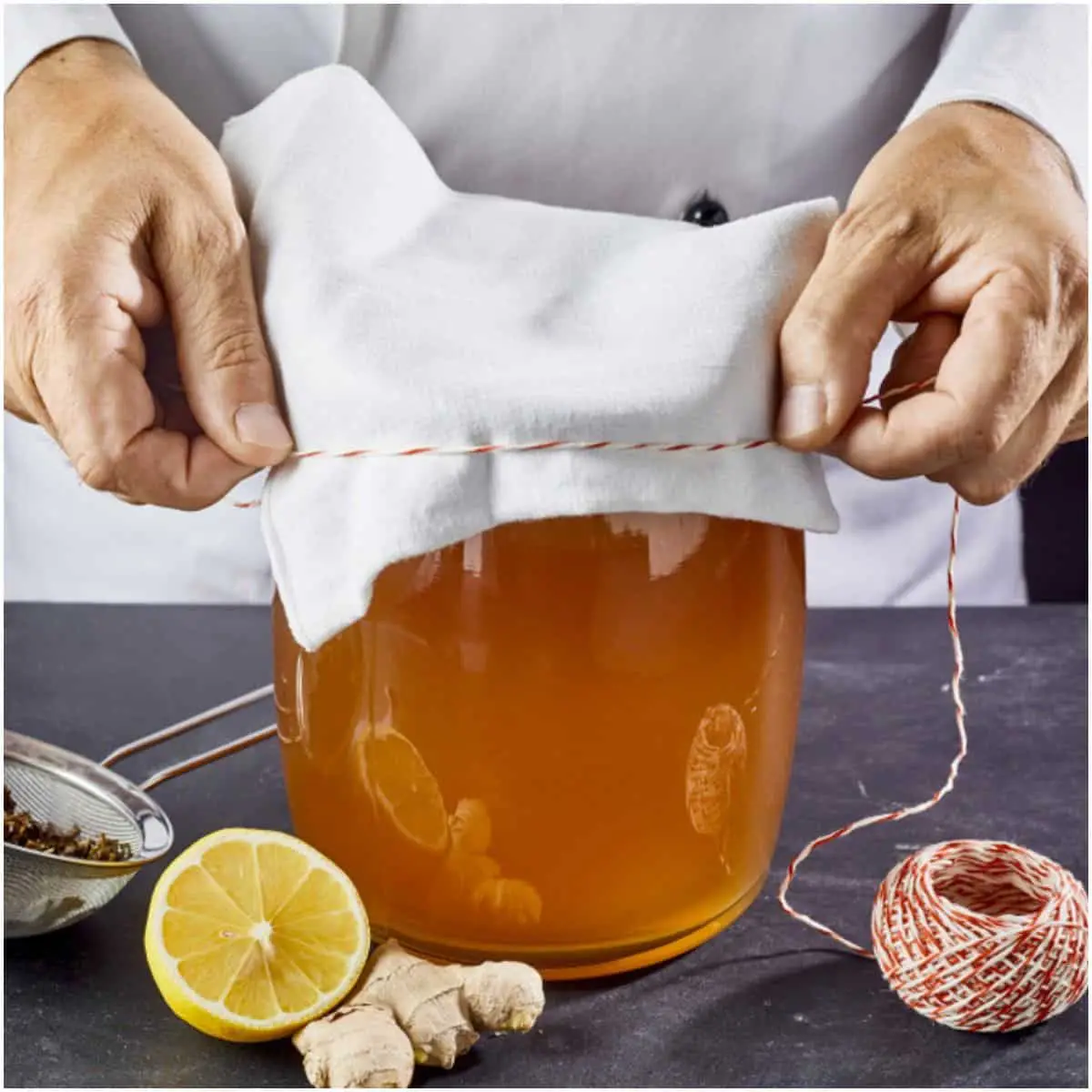What are the health benefits of Kombucha tea?
Introduction
Kombucha tea is a colony of microorganisms, “friendly” bacteria, and mushrooms in a fermentation environment of sweetened green or black tea, resulting in an acidulous and aromatic drink with a sweet-sour taste, similar to cider.
As this tea uses up the sugar, it produces a variety of organic acids, such as glucuronic acid, gluconic acid, lactic acid, acetic acid, butyric acid, malic acid, and usnic acid; vitamins, especially group B vitamins, vitamin C, amino acids and enzymes necessary for the human body.
This shows the benefits of probiotic cultures that help maintain health.
Researchers acknowledge that kombucha tea helps regulate digestion and balance the excreta.
Hippocrates said, “The disease first occurs in our intestines,” so healing the intestinal flora is the first and most important step in improving health.
Aleksandr Solzhenitsyn, writer and Nobel laureate, wrote about kombucha tea in one of his books, assigning it miraculous healing properties.
Influenced by this, former US president Ronald Reagan consumed a liter of this drink each day in his fight against cancer.
READ MORE: How To Avoid Food Coma
Kombucha tea contains many elements that are beneficial to health:
Enzymes
Enzymes, abundant in the kombucha, are essential for good digestion.
They help your body absorb vital nutrients from food.
Enzymes also help the body produce energy, assimilate nutrients, balance hormones, reduce inflammation, slow down the aging process, and many others.
Antioxidants
Antioxidants are most commonly known for their anti-aging properties. It is very rich in antioxidants.
When their levels are insufficient, free radicals cause cell damage, leading to aging and degenerative diseases, such as cancer, cardiovascular diseases, and other serious chronic diseases.
Polyphenols

SergeyYrev/Shutterstock
Polyphenols are also antioxidants. They are known for chasing away degenerative diseases (cancer, cardiovascular diseases) and also neurodegenerative (e.g., Alzheimer’s, Parkinson’s, multiple sclerosis).
READ MORE: Daily Biorhythm of Internal Organs
Probiotics
When the delicate ecosystem of the intestine becomes unbalanced due to stress, illness, or bad food, the natural defense system of your body is compromised.
This reduces the body’s ability to absorb essential nutrients, fight against pathogens, and eliminate harmful toxins.
Probiotics are beneficial microorganisms found in the intestine, essential in maintaining a healthy digestive tract. It contains several strains of these beneficial bacteria.
Glucuronic Acid
Glucuronic acid is known to help the liver detoxify.
Research shows that glucuronic acid is effective in preventing cancer, as it is a powerful anti-carcinogen.
Glucuronic acid is also one of the few agents that can detoxify oil-based products, such as plastics, herbicides, and pesticides.
Glucosamine
Glucosamine is essential for building cartilage. They also increase synovial fluids, such as hyaluronic acid, which helps prevent and treat many diseases of the arthritis type.
Regular consumption of kombucha relieves joint pains and gives greater flexibility.
Type B Vitamins
“Lack of energy” is the most common disease of people today.
B vitamins help your body produce energy from food and further support its ability to cope with stress and depression.
Kombucha contains many B vitamins, including B12, which is present in very few foods.
READ MORE: Alkaline Diet
Kombucha Tea – Preparation

stockcreations/Shutterstock
For the preparation of this drink, black or green tea is used, but other herbs as well (but not strongly volatile plants, such as lavender or yarrow, as oil forms a film on the tea surface, which can destroy or prevent the growth of bacteria colonies of the kombucha mushroom).
Keep a 1/5 proportion of herbal tea to green or black tea.
Make the tea as usual. Use 2-3 bags of black/green tea or 2 full teaspoons of loose tea (approx. 6g) at 1 liter of boiling water. Leave it for about 15 minutes (if you use herbs as well, follow the manufacturer’s instructions).
Remove the tea bags or strain the tea into a wide-mouth jar or enameled ceramic pot and add 80 g of sugar before it cools (1 tablespoon of sugar = 20 g). Stir until the sugar dissolves completely. Allow it to cool completely until it reaches room temperature (culture dies if placed in a hot, nutritious solution).
After cooling, add 100 ml of fermented tea for starter and kombucha mushroom.
Cover with gauze and let it ferment in the dark, in a warm place at 22 -28 °C.
After 6-10 or even 15 days, depending on the ambient temperature and also your taste, the obtained fermented liquid is filtered through filter paper or thick linen, put in bottles, and stored in a refrigerator.
The remaining mushroom, along with 100 ml of fermented tea, is still used for new crops. After several repeated use, the fungus will “grow old” and gain a dark brown color. When it becomes too dark, replace it with a new fresh fungus.
The crop must be protected from metal, cigarette smoke, and mold-contaminated environments.
The containers for the tea’s crop must be made only from glass, porcelain, glazed ceramic, wood, or plastic. Metal kills the crop.
Any problems regarding the quality of the drink or mildew in the culture dish are always related to non-compliance with the basic instructions: hygiene, an insufficient amount of sugar, hot nutritious solution, fermentation temperature too low/high, type of tea, quality, and grammage used.
READ MORE: Spiritual Causes of Autoimmune Diseases
Kombucha Tea – Side Effects & Precautions
Kombucha tea contains caffeine since it is usually made with green or black tea.
For instance, an 8-ounce serving of kombucha made from green tea contains about 10 mg of caffeine.
Caffeine may have a negative impact on glucose control, fertility, pregnancy, and other aspects of health.
Since it is a pretty powerful incentive for digestion, kombucha tea will be administered with caution in hyperacidity gastritis. It should also be taken in small doses at first by people suffering from colitis fermentation, stopping the administration at once if unpleasant symptoms occur.
In rare cases, kombucha can cause liver damage. This is more likely to occur if you have a pre-existing liver condition or if you drink large amounts of kombucha on a regular basis.
Although it has a low percentage of alcohol (0.5%), this remedy will not be consumed in large quantities by those who have to drive a car or unfold activities that require a high degree of precision and control.
Featured image credit – Shutterstock
READ THIS NEXT: Chia Seeds Side Effects
- About the Author
- Latest Posts
As a founder and chief author at InsightState.com, Bulgarea Candin helps readers on their spiritual journeys. His writings are designed to inspire creativity and personal growth, guiding readers on their journey to a more fulfilled and enlightened life.




Tuesday 18th of August 2015
I dont have starter tea and the kombucha mushroom, where can I get them??
Richard
Sunday 25th of April 2021
Amazon
Deborah
Sunday 23rd of August 2015
I poured two bottles of JT's original kombucha, although one bottle would probably be enough, in prepared sweetened tea and waited. The result? I created a beautiful and healthy scoby (kombucha mushroom).
admin
Tuesday 18th of August 2015
Hey. Try some local shops or online websites.